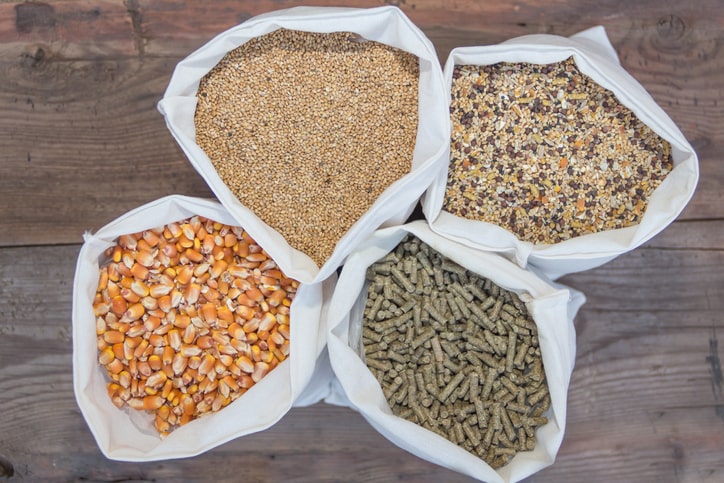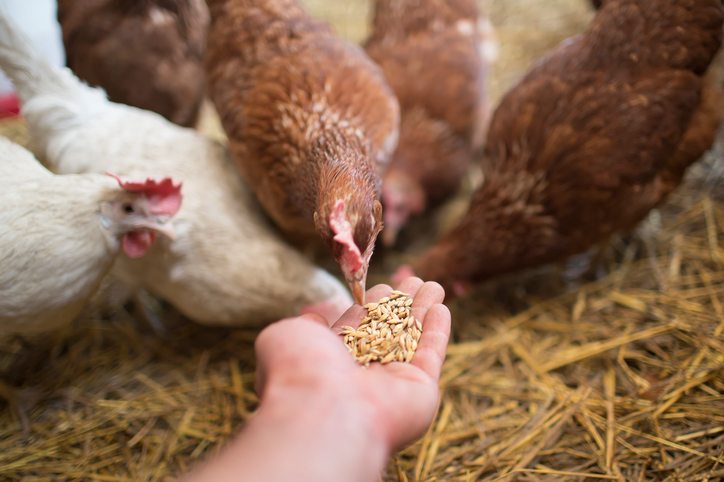Winter can be a challenging time for chicken keepers. When temperatures drop, providing the right diet is crucial to keep your flock healthy and productive. Understanding what to feed chickens in winter ensures they receive the necessary nutrients to stay warm and continue laying eggs.

Understanding Winter Nutritional Needs
During the winter, chickens’ dietary needs change. They require additional calories to maintain body heat and energy levels. Additionally, the shorter daylight hours affect their natural foraging habits, requiring a change in feeding strategies.
Increased Caloric Intake
Chickens need more calories to generate body heat. Incorporating high-energy foods like cracked corn can help meet this need. Cracked corn provides a quick energy source, aiding in maintaining body temperature.
Balanced Protein Levels
Protein is essential for feather growth and egg production. Including protein-rich foods like mealworms and soybeans ensures your chickens get sufficient protein. Aim for a balance of around 16-18% protein in their diet.

Essential Winter Feeding Tips
Provide Warm Water
Clean, warm water is crucial during winter. Chickens need consistent access to water to stay hydrated. Using heated water dispensers helps prevent freezing and ensures they remain healthy.
Include Leafy Greens
Leafy greens provide essential vitamins and minerals. While foraging may be limited, include greens like spinach, kale, and cabbage in their diet to ensure they receive necessary nutrients.

Supplementing with Treats
Healthy Treat Options
Occasional treats can help boost chickens’ energy levels. Healthy options include oatmeal, pumpkin seeds, and sunflower seeds. Avoid excessive treats to maintain a balanced diet.
Monitor Treat Intake
Treats should complement their regular diet, not replace it. Monitor the quantity to ensure treats don’t exceed 10% of their daily intake.

Preventing Nutritional Deficiencies
Calcium and Grit
Calcium is vital for strong eggshells. Include crushed oyster shells or limestone to meet their calcium needs. Additionally, grit aids in digestion, especially when foraging is limited.
Vitamins and Minerals
Supplement their diet with vitamins and minerals during winter. Vitamin D is particularly important, as reduced sunlight can lead to deficiencies. Cod liver oil is a good source of Vitamin D.
Ensuring Proper Feeding Practices
Regular Feeding Schedule
Maintain a consistent feeding schedule. Chickens thrive on routine, and regular feeding times help them stay healthy.
Avoid Overfeeding
While increased caloric intake is necessary, avoid overfeeding. Excess weight can lead to health problems. Monitor their weight and adjust portions accordingly.
Indoor Environment Considerations
Proper Ventilation
Ensure adequate ventilation in the coop to prevent moisture buildup. Good ventilation prevents respiratory issues and supports overall health.
Insulation and Warmth
Insulating the coop helps retain heat. Use straw or other materials to insulate walls. Providing a heat lamp can also help maintain a warm environment.
Special Considerations for Different Breeds
Cold-Hardy Breeds
Certain breeds are more suited for cold weather. Cold-hardy breeds like Rhode Island Reds and Wyandottes manage winter conditions better. Ensure their diet meets their specific needs.
Smaller Breeds
Smaller breeds may require extra care during winter. Paying attention to their dietary needs and ensuring they have a warm environment is crucial.
General Health Checks
Regular health checks are essential. Look for signs of illness and address them promptly. Regularly check for parasites and other health issues.
Feeding Schedule Adjustments
Morning Feeding
Providing a hearty breakfast helps chickens start their day with the energy they need. Include protein-rich food and grains.
Afternoon Feeding
A mid-afternoon feeding helps maintain energy levels. Include cracked corn to provide a quick energy boost before nightfall.
Storing Feed Properly
Use Airtight Containers
Store feed in airtight containers to prevent spoilage and keep pests away. Proper storage ensures the feed retains its nutritional value.
Check Expiry Dates
Regularly check feed expiry dates. Using fresh, high-quality feed is crucial for maintaining your chickens’ health.
Cold Weather Challenges
Dealing with Frozen Feed
Frozen feed can be challenging. Store feed indoors to prevent freezing. Break up clumps before feeding to ensure chickens can access the feed.
Managing Snow and Ice
Clear pathways to ensure chickens can move freely. Provide sheltered areas where they can escape harsh weather conditions.
FAQs
Q1: What are the best treats for chickens in winter?
A1: Healthy treats like oatmeal, pumpkin seeds, and sunflower seeds are excellent choices. These treats provide an energy boost while ensuring a balanced diet.
Q2: How often should I feed my chickens in winter?
A2: Maintain a regular feeding schedule with morning and afternoon feedings. A hearty breakfast and a mid-afternoon feeding help sustain their energy levels.
Q3: Do chickens need more water in winter?
A3: Yes, clean, warm water is essential. Using heated water dispensers prevents freezing and ensures chickens stay hydrated throughout winter.
For more information on related topics, check our articles Jumbo Eggs, Best Tasting, Longest Living, and External Link.
As an Amazon Associate, I earn from qualifying purchases.









